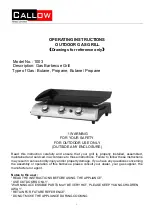
18
BS
18SBL
............................. 4772 47 01...
...000001-999999
...................................13 mm
...................................40 mm
.....................................6 mm
........................450/1750 min
-1
...................................65 Nm
...................................18 V
................................2-13 mm
..................................1,3 kg
..................................1,6 kg
..............................-18...+50 °C
..................................L18...R
..........................AL18G, BLK1218
................................79,5 dB (A)
................................68,5 dB (A)
..................................1,9 m/s
2
..................................1,5 m/s
2
ENGLISH
TECHNICAL DATA
CORDLESS DRILL DRIVER
Production code....................................................................................................
Drilling capacity in steel ................................................................................
Drilling capacity in wood .......................................................................................
Wood screws (without pre-drilling) .......................................................................
No-load speed, 1st gear / 2nd gear ......................................................................
Torque max ..........................................................................................................
Battery voltage......................................................................................................
Drill chuck range ...................................................................................................
Weight according EPTA-Procedure 01/2014 (1.5 Ah / 2.0 Ah) .............................
Weight according EPTA-Procedure 01/2014 (3.0 Ah / 4.0 Ah) .............................
Recommended ambient operating temperature ...................................................
Recommended battery types................................................................................
Recommended charger ........................................................................................
Noise/vibration information
Measured values determined according to EN 62841.
Typically, the A-weighted noise levels of the tool are:
Sound pressure level (Uncertainty K=5dB(A))..................................................
Sound power level (Uncertainty K=5dB(A)) ......................................................
Always wear ear protectors!
Total vibration values (vector sum in the three axes) determined according to EN
62841.
Drilling into metal
Vibration emission value a
h,D
............................................................................
Uncertainty
K
....................................................................................................
WARNING
WARNING Read all safety warnings, instructions, illustrations
and specifi cations provided with this power tool.
Failure to follow all
instructions listed below may result in electric shock, fi re and/or serious
injury.
Save all warnings and instructions for future reference.
DRILL SAFETY WARNINGS
Safety instructions for all operations
Hold the power tool by insulated gripping surfaces, when performing
an operation where the cutting accessory or fasteners may contact
hidden wiring.
Cutting accessory or fasteners contacting a “live” wire may make exposed
metal parts of the power tool “live” and could give the operator an electric
shock.
Safety instructions when using long drill bits
Never operate at higher speed than the maximum speed rated of the
drill bit.
At higher speeds, the bit is likely to bend if allowed to rotate freely
without contacting the workpiece, resulting the personal injury.
Always start drilling at low speed and with the bit tip in contact with
the workpiece.
At higher speeds, the bit is likely to bend if allowed to
rotate freely without contacting the workpiece, resulting the personal
injury.
Apply pressure only in direct line with the bit and do not apply
excessive pressure.
Bits can bend causing breakage or loss of control,
resulting in personal injury.
ADDITIONAL SAFETY AND WORKING INSTRUCTIONS
Use protective equipment. Always wear safety glasses when working with
the machine. The use of protective clothing is recommended, such as dust
mask, protective gloves, sturdy non-slip footwear, helmet and ear
defenders.
The dust produced when using this tool may be harmful to health. Do not
inhale the dust. Wear a suitable dust protection mask.
Do not machine any materials that present a danger to health (e.g. asbestos).
Switch the device o
ff
immediately if the insertion tool stalls! Do not switch
the device on again while the insertion tool is stalled, as doing so could
trigger a sudden recoil with a high reactive force. Determine why the
insertion tool stalled and rectify this, paying heed to the safety instructions.
The possible causes may be:
• it is tilted in the workpiece to be machined
• it has pierced through the material to be machined
• the power tool is overloaded
Do not reach into the machine while it is running.
The insertion tool may become hot during use.
WARNING!
Danger of burns
• when changing tools
• when setting the device down
Chips and splinters must not be removed while the machine is running.
When working in walls ceiling, or fl oor, take care to avoid electric cables
and gas or waterpipes.
Clamp your workpiece with a clamping device. Unclamped workpieces
can cause severe injury and damage.
Remove the battery pack before starting any work on the machine.
The vibration and noise emission level given in this information sheet has been measured in accordance with a standardized test given in EN 62841 and
may be used to compare one tool with another. It may be used for a preliminary assessment of exposure.
The declared vibration and noise emission level represents the main applications of the tool. However if the tool is used for di
ff
erent applications, with
di
ff
erent accessories or poorly maintained, the vibration and noise emission may di
ff
er. This may signifi cantly increase the exposure level over the total
working period.
An estimation of the level of exposure to vibration and noise should also take into account the times when the tool is switched o
ff
or when it is running but
not actually doing the job. This may signifi cantly reduce the exposure level over the total working period.
Identify additional safety measures to protect the operator from the e
ff
ects of vibration and/or noise such as: maintain the tool and the accessories, keep the
hands warm, organization of work patterns.
470 409 - BS18SBL.indd 18
470 409 - BS18SBL.indd 18
06.07.2020 10:55:16
06.07.2020 10:55:16
Autogoods “130”
130.com.ua
















































